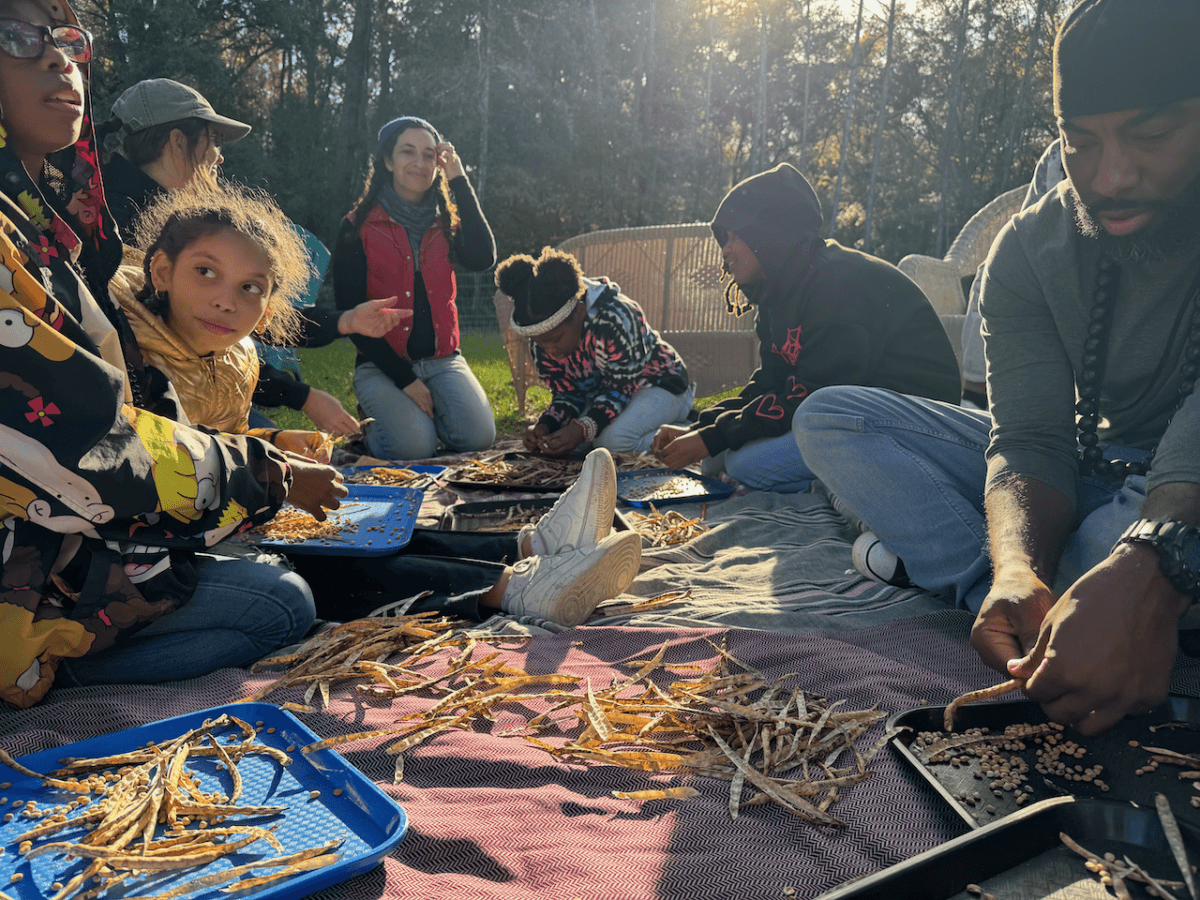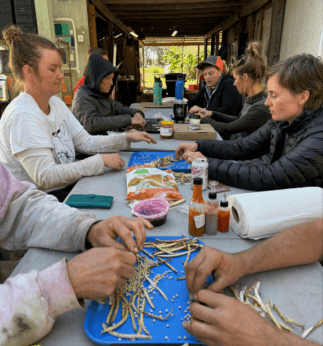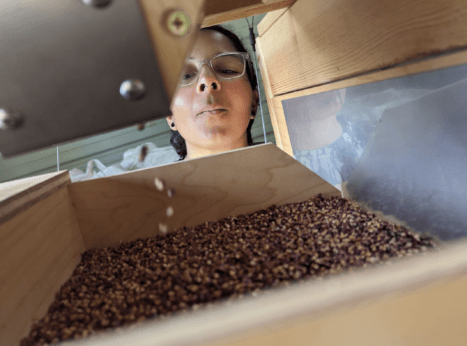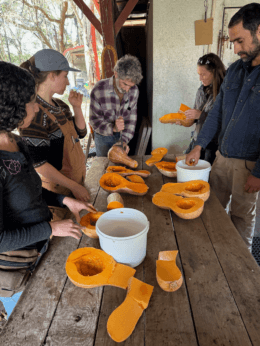On the Ground With Growers Working to Localize Seed Production
The local food movement often has its roots in seeds grown far afield, but more farmers want to bring those foundational pieces of agriculture back home.
On the Ground With Growers Working to Localize Seed Production
The local food movement often has its roots in seeds grown far afield, but more farmers want to bring those foundational pieces of agriculture back home.

Nicoya Farm hosts students on a field trip. They are shelling peas while learning about local seeds. submitted by Melissa DeSa
For many small-scale fruit and vegetable growers, “local” is the word that makes their business work. Shoppers seek out—and pay premiums for—the promise that a juicy tomato or vibrant squash was raised right down the road.
Yet much of the time, the local food economy ultimately depends on big farms thousands of miles across the country or even overseas: the seed producers who provide planting stock for the growing season. The resulting seeds, developed under very different environmental conditions, aren’t always a great agricultural fit for the farms that grow them. And mistakes by large seed farms can reverberate widely, as with last year’s “Jalapeñogate,” where stores across the United States sold peppers that had been mislabeled by an international grower.
Phil Howard, a professor of community sustainability at Michigan State University, has estimated that more than 60 percent of the global seed market is now controlled by four multinational companies after decades of consolidation through corporate acquisitions. Even regional seed distributors often get supplies from those centralized sources.
Aware of that disconnect, some growers are trying to keep things local all through the supply chain—including seed farming. Their efforts could make their local food systems more resilient, with seeds better adapted to regional climates and soils.

Chris Smith’s Appalachian collective
Since 2018, Chris Smith has been working to promote agricultural biodiversity through his nonprofit Utopian Seed Project, based in Asheville, North Carolina. He’s explored and promoted obscure cultivars of southern staples such as Turkish Yalova Akkoy okra and colorful Ole Timey Blue collard greens, as well as experimented with creating new genetic potential through “ultracrosses” of many existing varieties.
“We’ve been talking about these seeds as ‘the seeds that know the South,’” says Smith. “They understand the heat, the humidity, the diseases and can respond better to that because they’ve been grown locally.”
To get those types of seeds into more hands, however, Smith knew he’d need a broader coalition. In 2022, he partnered with fellow farmers Leeza Chen and Shelby Johnson to reach out to regional growers and discuss what a local seed initiative might look like. They knew they wanted an approach radically different from the centralized model that dominates the market.
“It all has to be built on relationships; we have to know the people and trust the people that we’re working with,” says Smith. The group held monthly meetings with local farmers, many in-person around boxes of pizza, to establish shared values and goals.
What emerged was the Appalachian Seed Growers Collective. About a dozen members agreed to grow 11 regionally adapted crops in 2023, with the collective using a $25,000 grant from the Ceres Trust to invest in a mobile trailer that can visit each farm and process seeds using a “Winnow Wizard” and a threshing machine.
Varieties on offer during the collective’s first season this year included Coral Sorghum, a cultivar Johnson is developing for both grain and syrup production; Blue Ridge Butternut, a squash resulting from 15 years of breeding by Western North Carolina farmer Matt Wallace; and Living Web Ventura Celery, which has naturalized and diversified over a decade of self-seeding.
Smith admits that the economics of seed work can be challenging, with global suppliers able to leverage scale and lower labor costs. But on the consumer side, the collective is working to boost demand by educating area distributors and gardeners about the added value of local seeds. Asheville’s Sow True Seed, where Smith worked prior to starting the Utopian Seed Project, is paying a premium for the seeds as part of its mission to support local growers.
On the production side, the collective guarantees farmers payment based on the amount of land they dedicate to seeds regardless of yield, which reduces the financial risk of a bad harvest. Smith says that approach can encourage more sustainable growing and shift attitudes away from regarding seeds as pure commodities. “We’re distributing the seeds, but what we’re really valuing is the people’s land and labor in producing them,” he explains.

Melissa DeSa’s seeds at work
Although Melissa DeSa grew up amid the snows of Western Canada, she took the first chance she got to move somewhere with a bit more sunshine— Sarasota, Florida—to work as a wildlife ecologist.
A friend there got her involved in the local chapter of Slow Food, where she became passionate about the connections between agriculture and the environment, and after graduating from an ecology masters program at the University of Florida, DeSa cofounded the nonprofit Working Food in Gainesville in 2012. She soon became convinced that the long-term success and sustainability of Florida’s agriculture depended on locally adapted seeds.
“Florida seems like a great place to grow stuff, and we do have a nice year-round growing season,” says DeSa. “But we also have poor, sandy soil and a lot of pest and disease issues that never get knocked back by freezes. We can’t just open up these big, beautiful heirloom seed catalogs, pick things, throw them in the soil and have them do well.”
DeSa established Working Food as a regional seed hub around north-central Florida, supplying local gardeners and market farmers with thousands of packets of suitable varieties. The bulk of those seeds are grown in Gainesville in partnership with GROW HUB, a nonprofit nursery that serves adults with disabilities. Others are raised by the University of Florida’s Field & Fork teaching farm or gardeners with a row to spare.
One local cultivar DeSa has championed is the Seminole pumpkin, long grown by the state’s Native communities. They’re robust against squash vine borers, taste pleasantly sweet and keep extremely well—a key quality in the humid Florida climate. “Having a pumpkin that can sit on your kitchen counter at 75 degrees for six, eight, 10 months? That’s pretty awesome,” she says.
Last year, Working Food scored a $41,000 grant from the US Department of Agriculture’s Sustainable Agriculture Research and Education program to help encourage seed farming among local market gardeners. By building a network of local seed suppliers, DeSa says Florida can become more prepared for an uncertain future.
“I truly believe that if, say, during the pandemic, more growers already had these decentralized seed systems and food distribution systems in place, it wouldn’t have felt so crazy and scary,” she says. “We can’t depend on those big institutions or companies that are centralized to always be able to come through for us.”
Edmund Frost’s research and resilience
Edmund Frost’s job involves eating a lot of cucumber. As a member-owner of Common Wealth Seed Growers, he’s led the Louisa, Virginia-based project’s efforts to breed and produce regionally adapted vegetable seeds since 2014, and the cucurbits are a major focus.
“You’re looking for sweetness, crispness and a kind of cucumbery aromatic flavor, while avoiding bitterness and excessive astringency,” says Frost of his taste-test checklist. “Some plants will produce a lot, they’ll look good, but the cucumbers aren’t really inspiring.”
Just as importantly, his two leading varieties—South Wind Slicer and Common Wealth Pickler—can stand up to the heat and downy mildew pressure of late summer in Virginia, when most other cucumber cultivars have already petered out. Many breeders for the big seed catalogs are based in the Northeast, says Frost, and while their varieties often grow quickly and productively, they haven’t taken the conditions of the South into account.
Beyond breeding cucumbers, butternut squash, pumpkins and melons, Common Wealth has helped introduce varieties previously unknown to the South, such as a Guatemalan green ayote squash, that do particularly well in the area. Frost says the goal is to get market farmers and gardeners thinking more deeply about how to match the seeds they select with their regional realities.
“The idea with starting Common Wealth was to express values of regional adaptation and research through seeds, get those out to the customers and then the customers would value and pay for it to help fund our research,” he says.
The ideal of resilience has taken on particular resonance for Frost: In March, a wildfire tore through the Twin Oaks intentional community where he lives, consuming a warehouse that housed Common Wealth seeds. Thankfully, many seeds were in another location due to planned renovations on the building; he expects his work to recover, and he plans to back up his stocks in multiple locations for the future.
Frost says the fire highlights why a more distributed, locally adapted seed economy will be so important in a time of climate uncertainty. “There’s so much opportunity—and need—for people to do seed work in our region,” he says. “I’d love to see a dozen farm-based seed companies in the Southeast.”

Want to learn more about local seeds?
The first thing to do is shop local! Buy local seeds, ask your local nursery or garden center to stock local seeds or find growers near you who are prioritizing local varieties.
Learn how to save local seeds yourself with our handy guide to seed saving, and connect with other seed savers on the Seed Savers Exchange, where you can find other heirloom varieties and learn more about particular plants in your area.
To find out who is working with local seeds near you, try out the Local Seed Search map. In Canada, you can use this map from the Young Agrarians to find your local seed source.
Follow us
This work is licensed under a Creative Commons Attribution-NoDerivatives 4.0 International License.
Want to republish a Modern Farmer story?
We are happy for Modern Farmer stories to be shared, and encourage you to republish our articles for your audience. When doing so, we ask that you follow these guidelines:
Please credit us and our writers
For the author byline, please use “Author Name, Modern Farmer.” At the top of our stories, if on the web, please include this text and link: “This story was originally published by Modern Farmer.”
Please make sure to include a link back to either our home page or the article URL.
At the bottom of the story, please include the following text:
“Modern Farmer is a nonprofit initiative dedicated to raising awareness and catalyzing action at the intersection of food, agriculture, and society. Read more at <link>Modern Farmer</link>.”
Use our widget
We’d like to be able to track our stories, so we ask that if you republish our content, you do so using our widget (located on the left hand side of the article). The HTML code has a built-in tracker that tells us the data and domain where the story was published, as well as view counts.
Check the image requirements
It’s your responsibility to confirm you're licensed to republish images in our articles. Some images, such as those from commercial providers, don't allow their images to be republished without permission or payment. Copyright terms are generally listed in the image caption and attribution. You are welcome to omit our images or substitute with your own. Charts and interactive graphics follow the same rules.
Don’t change too much. Or, ask us first.
Articles must be republished in their entirety. It’s okay to change references to time (“today” to “yesterday”) or location (“Iowa City, IA” to “here”). But please keep everything else the same.
If you feel strongly that a more material edit needs to be made, get in touch with us at [email protected]. We’re happy to discuss it with the original author, but we must have prior approval for changes before publication.
Special cases
Extracts. You may run the first few lines or paragraphs of the article and then say: “Read the full article at Modern Farmer” with a link back to the original article.
Quotes. You may quote authors provided you include a link back to the article URL.
Translations. These require writer approval. To inquire about translation of a Modern Farmer article, contact us at [email protected]
Signed consent / copyright release forms. These are not required, provided you are following these guidelines.
Print. Articles can be republished in print under these same rules, with the exception that you do not need to include the links.
Tag us
When sharing the story on social media, please tag us using the following: - Twitter (@ModFarm) - Facebook (@ModernFarmerMedia) - Instagram (@modfarm)
Use our content respectfully
Modern Farmer is a nonprofit and as such we share our content for free and in good faith in order to reach new audiences. Respectfully,
No selling ads against our stories. It’s okay to put our stories on pages with ads.
Don’t republish our material wholesale, or automatically; you need to select stories to be republished individually.
You have no rights to sell, license, syndicate, or otherwise represent yourself as the authorized owner of our material to any third parties. This means that you cannot actively publish or submit our work for syndication to third party platforms or apps like Apple News or Google News. We understand that publishers cannot fully control when certain third parties automatically summarize or crawl content from publishers’ own sites.
Keep in touch
We want to hear from you if you love Modern Farmer content, have a collaboration idea, or anything else to share. As a nonprofit outlet, we work in service of our community and are always open to comments, feedback, and ideas. Contact us at [email protected].by Daniel Walton, Modern Farmer
April 29, 2024
Modern Farmer Weekly
Solutions Hub
Innovations, ideas and inspiration. Actionable solutions for a resilient food system.
ExploreExplore other topics
Share With Us
We want to hear from Modern Farmer readers who have thoughtful commentary, actionable solutions, or helpful ideas to share.
SubmitNecessary cookies are absolutely essential for the website to function properly. This category only includes cookies that ensures basic functionalities and security features of the website. These cookies do not store any personal information.
Any cookies that may not be particularly necessary for the website to function and are used specifically to collect user personal data via analytics, ads, other embedded contents are termed as non-necessary cookies.